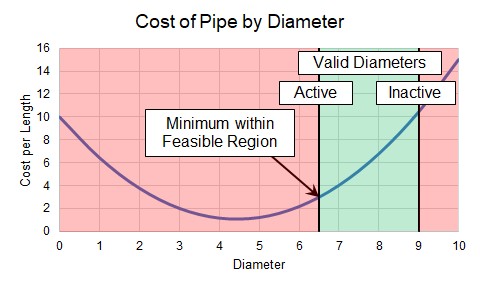Active, Inactive, and Violated Design Requirements
Design Requirements may or may not drive the sizing solution. Design Requirements are Active if they drive the sizing solution. Design Requirements that have no impact on the sizing solution are Inactive.
There can easily be Design Requirements that, while important for normal operation, do not drive the sizing solution because violating them would not improve the Objective. These Inactive Design Requirements could be removed entirely without changing the sizing solution.
It is not always easy to tell what Design Requirements will be Active or Inactive. A better overall solution can easily often obtained by making a local selection more expensive. This means that Design Requirements that would appear to only affect high-cost options may in fact be Active.
Knowing which Design Requirements are Active or Inactive in a sizing analysis can provide valuable insight into a design. Perhaps one Design Requirement is significantly increasing the cost of the system, but is not critical to the operation. In such cases it may be worthwhile to relax the restriction and modify the Design Requirement for a cheaper solution.
A Design Requirement is Violated if it is not met. During the sizing process it is common that Design Requirements will be Violated. However, if a solution exists, they should only be Active or Inactive in the final result.
Conceptual Example
Adding a specific Design Requirement to our pipe changed the sizing solution. What if we had also added a maximum flow rate, effectively imposing a maximum diameter? It will not impact the sizing solution, despite it being an important consideration for our system. Our original Design Requirement is considered Active, because it is driving the sizing solution, while the second Design Requirement is considered Inactive. As before, the absolute minimum cost diameter would Violate our minimum flow requirement, making it infeasible (Figure 1).

Figure 1: Multiple Design Requirements
Piping is generally not available in any requested size, but instead only in selected, Discrete diameters, which will also affect the sizing solution.



